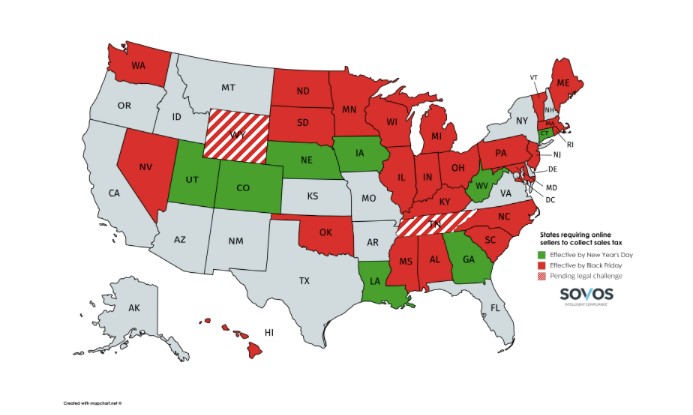While online retail businesses used to have to pay sales tax only in states where they had a physical presence, a June Supreme Court ruling has given states the ability to make companies collect online sales tax, so your Christmas shopping bill depends on where you live, or shop.
For giant nationwide retailers selling online, sales tax was already a reality because of their wide physical presence, but for businesses with smaller brick-and-mortar footprints—like Wayfair and Overstock--no sales tax has been a selling advantage.
As such, the Supreme Court decision could end up shifting the advantage even further to the big players.
So far, this holiday season, 11 states have started collecting from online retailers as of October 1st, and another six are scheduled to jump on this band wagon by the end of this year or the beginning of next.
Alabama, Illinois, Indiana, Kentucky, Maryland, Minnesota, Nevada, New Jersey, North Dakota, Washington, and Wisconsin have launched their online sales tax requirements in October, AP reported.
By the end of this year, over 30 states will require retailers to collect sales taxes for online purchases.
The full line-up of online sales taxes, by state, looks like this:

(Click to enlarge)
It could mean even an even bigger Cyber Monday turnout than usual, as shoppers try to get in what may be their last sales-tax-free big ticket buying event. Last year, 81 million shoppers spent nearly $6.6 billion on Cyber Monday, and this year, expectations are for that to hit $7.25 billion, according to Forbes.
Buying online will cost shoppers the most in Louisiana, where the highest average combined state and local sales tax rates are 10.02 percent. That’s followed by Tennessee, with 9.46 percent, Arkansas, with 9.41 percent, Washington, with 9.18 percent and Alabama, with 9.10 percent, Forbes notes, citing the Tax Foundation.
Overall, shoppers can expect to spend up to 8 percent more than last year at some online sites.
Overstock used to collect sales tax in eight states, according to AP, but since June, that’s grown to every state. Similarly, Wayfair used to collect sales tax in 25 states, but now collects in 36.
According to Chuck Maniace, director of regulatory analysis at Wilmington-based Sovos, a tax compliance software provider, as reported by YahooFinance, “On balance, if you live in a state that has enacted a remote seller collection rule and you buy online from sellers that historically don’t charge tax, expect to pay approximately 8% more for your purchases. So, if you plan on spending $600 online this holiday season, reserve at least an additional $48 for tax.” Related: Black Friday A Welcome Distraction For Amazon
While shoppers won’t like it, and the non-giant online business such as Wayfair and Overstock might lose some more advantage to behemoths like Amazon, small brick-and-mortar businesses love the idea.
“It’s a leveling of the playing field, we believe, because online retailers had a 7 percent roughly advantage over your brick and mortar store that was in your community,” Andy Ellen with the North Carolina Retail Merchants Association, told reporters right ahead of Black Friday.
Retailers aren’t exactly flinching right now, though.
While brick-and-mortar physical shopping traffic this Black Friday fell 9 percent compared to last year, shoppers spent more money online, according to data from RetailNext and ShopperTrak, as reported by MarketWatch. From last Wednesday through Black Friday, internet sales rose by 26.4 percent year-over year, according to Adobe Systems Inc.
Sales taxes for online purchases may be coming to every state this year and next, but online shoppers aren’t backing down. Online shopping has become too prevalent to be cowed by sales taxes at this point. So, it’s Cyber Monday … full click ahead.
By Fred Dunkley for Safehaven.com
More Top Reads From Safehaven.com:
















